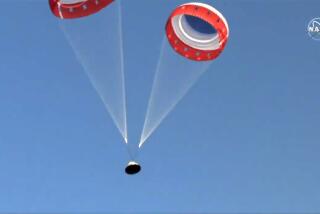Two Cosmonauts Blast Off on Mission to Repair Mir
- Share via
MOSCOW — Two Russian cosmonauts blasted off Tuesday from the Baikonur Cosmodrome in Kazakhstan on a crucial mission to repair the Mir space station and revive its function as an orbiting laboratory.
Veteran commander Anatoly Solovev and rocket engineer Pavel Vinogradov will take over from the two cosmonauts already aboard and try to restore full power to the ship and repair the holes in its shell.
Shortly before the repair crew took off, the station reported yet another problem for the newcomers to help fix. The station’s temperamental oxygen system failed, and its crew, which includes an American, had to rely on oxygen cartridges.
Russian space officials said the problem was minor and posed no threat. The station has a two-month supply of cartridges, they said, and if the new crew succeeds in its repairs there will be enough electricity to turn on a backup oxygen generator.
The mission’s success is critical to the future of Russia’s manned space program and its ability to earn needed income by sharing Mir’s labs with the United States and other nations.
The fiery launch of the Soyuz capsule carrying the cosmonauts on their 48-hour journey to Mir appeared flawless.
In a brief conversation with the Mission Control Center after the launch, Solovev reported that the ship was functioning normally. Vinogradov--a space rookie--reported that he was exhilarated by the flight.
“This is not Solovev’s first time in space, so his mood is very businesslike,” said Mission Control spokesman Valery Lyndin. “Vinogradov, at the same time, is very excited and says that everything outside looks very beautiful.”
Mir lost half its power supply in June when a cargo ship collided with it and punctured the station’s Spektr research module. As air began escaping from the craft, crew members cut power cables that ran through a doorway so they could seal off the module.
The ship that collided with Mir is still docked with the station; it will be detached and parked half a mile away Thursday so the new crew can dock. The two Russian members of the current crew, Vasily Tsibliyev and Alexander Lazutkin, will leave for Earth a week later. U.S. astronaut Michael Foale, a NASA physicist, will stay on.
In two weeks, Vinogradov is scheduled to put on a spacesuit, enter the airless module and reconnect the cables while Solovev assists him. The procedure is risky because of the possibility that debris in the depressurized module could tear a hole in Vinogradov’s spacesuit.
But before the launch, the two expressed confidence in their ability to complete the repair. “On Aug. 20, when we plug in all the energy systems, the whole complex will start its work almost as it was before,” said Solovev, regarded by many as Russia’s most able cosmonaut.
Once Mir’s power is restored, the two new cosmonauts are scheduled to conduct a series of spacewalks in the hope of locating the punctures and patching them.
The problems aboard Mir have forced the cancellation of flights by two astronauts who were scheduled to conduct scientific experiments there: Frenchman Leopold Eyharts and U.S. Navy Cmdr. Wendy Lawrence, who lost her spot because she is too short to fit into the spacesuit used for spacewalks and never received spacewalk training. Lawrence’s place will be taken by astronaut David Wolf, a physician, if the power is restored. Eyharts is now scheduled to fly to Mir in January.
In four previous Mir missions, Solovev logged 456 days in space and nine spacewalks, gaining a reputation as an ace pilot and reliable problem-solver who remains calm in a crisis.
During a 1990 spacewalk, Solovev and a colleague were trapped outside Mir when an air-lock door would not close, forcing them to make an emergency entrance through another door as their air supply reached a dangerously low level.
Vinogradov spent years working on rocket designs, including the ill-fated Buran--a Soviet space shuttle that made one flight before it was grounded. He was supposed to fly to Mir last year, but the commander of his crew suffered heart problems at the last minute and the backup crew was sent instead.
“We are like babies in space,” Vinogradov told reporters before the launch. “We’ve just started to work there. . . . These are only our first steps.”
Like professional athletes in the U.S. and top business executives, the Russian cosmonauts have contracts with incentive bonuses that reward them for good performances, the newspaper Izvestia reported in today’s edition. Solovev and Vinogradov will receive about $40,000 apiece for their 194 days in space--a huge amount by Russian standards.
The sum includes $100 for every day in orbit, $1,000 for every spacewalk and bonuses for successful docking of capsules and handling of emergency situations.
More to Read
Sign up for Essential California
The most important California stories and recommendations in your inbox every morning.
You may occasionally receive promotional content from the Los Angeles Times.













